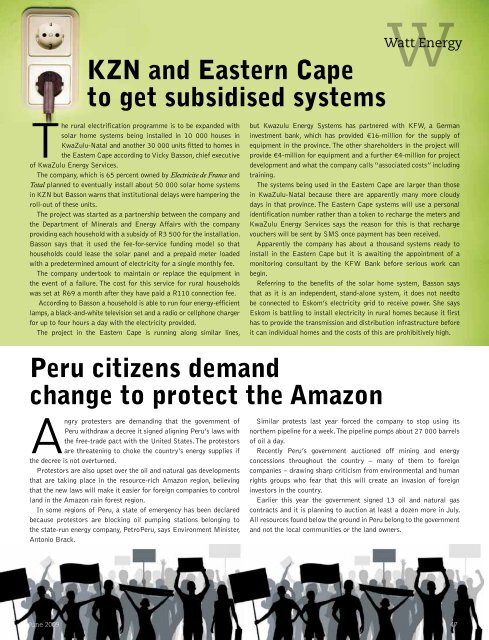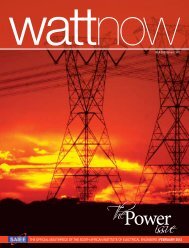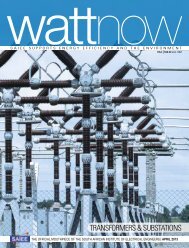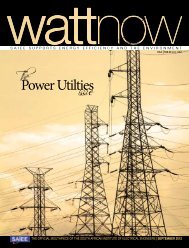W<strong>Watt</strong>’s ScienceAddis Ababa tracksclimate change in AfricaThe African Union has set up a satellite receiving station totrack <strong>the</strong> effects <strong>of</strong> climate change. It is <strong>the</strong> first station <strong>of</strong>its kind and is known as <strong>the</strong> AU-African Monitoring and <strong>the</strong>Environment for Sustainable Development. The receivingstation is based in Addis Ababa and will receive its data from <strong>the</strong>European satellite agency.For centuries <strong>the</strong> African continent has been plagued <strong>the</strong> inevitablerepetition <strong>of</strong> droughts that last for years, decades or even centuries ata time. These natural phenomena are compounded by <strong>the</strong> enormousemissions <strong>of</strong> greenhouse gases that spew out across <strong>the</strong> continent,contributing to rapid climate change. The receiving station in AddisAbaba was financed by <strong>the</strong> European Union.In a separate development, Pr<strong>of</strong>essor David Block <strong>of</strong> <strong>the</strong> University<strong>of</strong> <strong>the</strong> Witwatersrand claims that he and his team <strong>of</strong> researchers havefound star-streams in galaxies millions <strong>of</strong> light years away. He says<strong>the</strong>se star streams could be <strong>the</strong> missing link in galaxy genesis.Block says that astronomers have been puzzled by how young starsform clusters in dense molecular clouds and <strong>the</strong>n eventually disperseinto o<strong>the</strong>r areas <strong>of</strong> <strong>the</strong> galactic disc. However, observations <strong>of</strong> <strong>the</strong>spiral galaxies <strong>of</strong> Whirlpool (25-million light years away) and Messier81 (12-million light years away) indicate that <strong>the</strong> young stars form intoclusters but <strong>the</strong>n seed out in clear dispersion patterns or star-streams.The star-streams provide a disc-like appearance that categorisesspiral galaxies. Star-streams were observed after <strong>the</strong> NationalAeronautics and Space Administration deployed <strong>the</strong> $800-millionSpitzer Space telescope – an infrared observatory that made itpossible to identify and study star-streams.The telescope is able to penetrate dense cosmic dust and filter outolder stars from newer ones. According to Block, <strong>the</strong> infrared imagesfrom Spitzer produced pictures that actually revealed groups <strong>of</strong> starstransforming <strong>the</strong>mselves from dense, irregular patches into mini-spirals.To identify <strong>the</strong> arc patterns, a spatial filter and a time filter were used.Engine from <strong>the</strong> 1800s to be used on <strong>the</strong> MoonScientists at <strong>the</strong> National Aeronautics and Space Administrationtrying to find an engineering solution to a simple, yetvery important problem: how to brew a cup <strong>of</strong> c<strong>of</strong>fee on <strong>the</strong>Moon. The moon has rare sunlight, no coal or wood to burnand no flowing water to make hydro-electricity.So NASA has resorted to improving <strong>the</strong> concept <strong>of</strong> Fission SurfacePower and plan to use an engine invented in <strong>the</strong> early 1800s by twoScottish bro<strong>the</strong>rs, Robert and James Stirling to produce c<strong>of</strong>fee ando<strong>the</strong>r warm drinks in space.The bro<strong>the</strong>rs were extremely proud <strong>of</strong> <strong>the</strong>ir invention and named <strong>the</strong>engine <strong>the</strong> engine <strong>the</strong> Stirling. Since its invention it has earned itself anexcellent reputation for being <strong>the</strong> “little engine that could”.According to scientist Mike Houts <strong>of</strong> NASA Marshall Space FlightCentre, <strong>the</strong> tried and true Stirling engine is reliable, efficient, versatile,clean and ideal for use in space.NASA is now partnering with <strong>the</strong> Department <strong>of</strong> Energy to develop<strong>the</strong> fission surface power technology so that it can produce heat andfeed this heat into a Stirling engine, which, in turn, can convert <strong>the</strong> heatenergy into electricity to make c<strong>of</strong>fee on <strong>the</strong> Moon, Mars or any far-<strong>of</strong>fsettlement anywhere in space.Houts says that <strong>the</strong> power system does not need sunlight to operateand <strong>the</strong> fission surface power technology could be used to providepower anywhere and at any time. The system could wea<strong>the</strong>r cold lunarnights, operate in deep craters that are permanently in shade or in <strong>the</strong>middle <strong>of</strong> a Martian dust storm, which is enough obscure <strong>the</strong> sun.The power level <strong>of</strong> <strong>the</strong> fission surface power system is just one 20000th <strong>of</strong> what a reactor on Earth would generate. The reactor wouldbe about 25 centimetres wide and 45 centimetres long and wouldprovide more power with less mass that o<strong>the</strong>r power system.The team is now conducting test in a <strong>the</strong>rmal vacuum to learn aboutoperating and controlling <strong>the</strong> system on <strong>the</strong> moon. They are usingresistance heaters to simulate nuclear heat.If <strong>the</strong> pro<strong>of</strong> <strong>of</strong> concept succeeds, a reactor will be built from stainlesssteel and will be fuelled by uranium dioxide. It would be turned on oncein place on <strong>the</strong> lunar surface and would be surrounded by shields toprevent any hazards being encountered from <strong>the</strong> radiation emitted.Here’s how <strong>the</strong> system works: inside <strong>the</strong> reactor are a bundle <strong>of</strong>small tubes filled with uranium. Outside <strong>the</strong> reactor are control drumsand one side <strong>of</strong> each drum reflects neutrons and <strong>the</strong> o<strong>the</strong>r side absorbs<strong>the</strong>m, providing a way to control <strong>the</strong> rate that neutrons escaping <strong>the</strong>reactor core are reflected back.To start <strong>the</strong> unit, <strong>the</strong> absorbent side <strong>of</strong> each control drum is turned out,away from <strong>the</strong> reactor cores so <strong>the</strong> reflective material faces in and sendsescaping neutrons back into <strong>the</strong> core. The resulting increase in availableneutrons enables a self-sustaining chain reaction, which produces heat.A coolant (in this case, a sodium potassium mixture) flows through<strong>the</strong> passage-ways between <strong>the</strong> tubes, picks up <strong>the</strong> <strong>the</strong>rmal heat producedby <strong>the</strong> reacting uranium and transfers <strong>the</strong> heat to <strong>the</strong> Stirling engine.The Stirling engine uses <strong>the</strong> heat to make electricity and, <strong>of</strong> course, <strong>the</strong>electricity is immediately used to make a cup <strong>of</strong> c<strong>of</strong>fee.46
KZN and Eastern Capeto get subsidised systemsW<strong>Watt</strong> EnergyThe rural electrification programme is to be expanded withsolar home systems being installed in 10 000 houses inKwaZulu-Natal and ano<strong>the</strong>r 30 000 units fitted to homes in<strong>the</strong> Eastern Cape according to Vicky Basson, chief executive<strong>of</strong> KwaZulu Energy Services.The company, which is 65 percent owned by Electricite de France andTotal planned to eventually install about 50 000 solar home systemsin KZN but Basson warns that institutional delays were hampering <strong>the</strong>roll-out <strong>of</strong> <strong>the</strong>se units.The project was started as a partnership between <strong>the</strong> company and<strong>the</strong> Department <strong>of</strong> Minerals and Energy Affairs with <strong>the</strong> companyproviding each household with a subsidy <strong>of</strong> R3 500 for <strong>the</strong> installation.Basson says that it used <strong>the</strong> fee-for-service funding model so thathouseholds could lease <strong>the</strong> solar panel and a prepaid meter loadedwith a predetermined amount <strong>of</strong> electricity for a single monthly fee.The company undertook to maintain or replace <strong>the</strong> equipment in<strong>the</strong> event <strong>of</strong> a failure. The cost for this service for rural householdswas set at R69 a month after <strong>the</strong>y have paid a R110 connection fee.According to Basson a household is able to run four energy-efficientlamps, a black-and-white television set and a radio or cellphone chargerfor up to four hours a day with <strong>the</strong> electricity provided.The project in <strong>the</strong> Eastern Cape is running along similar lines,but Kwazulu Energy Systems has partnered with KFW, a Germaninvestment bank, which has provided €16-million for <strong>the</strong> supply <strong>of</strong>equipment in <strong>the</strong> province. The o<strong>the</strong>r shareholders in <strong>the</strong> project willprovide €4-million for equipment and a fur<strong>the</strong>r €4-million for projectdevelopment and what <strong>the</strong> company calls “associated costs” includingtraining.The systems being used in <strong>the</strong> Eastern Cape are larger than thosein KwaZulu-Natal because <strong>the</strong>re are apparently many more cloudydays in that province. The Eastern Cape systems will use a personalidentification number ra<strong>the</strong>r than a token to recharge <strong>the</strong> meters andKwaZulu Energy Services says <strong>the</strong> reason for this is that rechargevouchers will be sent by SMS once payment has been received.Apparently <strong>the</strong> company has about a thousand systems ready toinstall in <strong>the</strong> Eastern Cape but it is awaiting <strong>the</strong> appointment <strong>of</strong> amonitoring consultant by <strong>the</strong> KFW Bank before serious work canbegin.Referring to <strong>the</strong> benefits <strong>of</strong> <strong>the</strong> solar home system, Basson saysthat as it is an independent, stand-alone system, it does not needtobe connected to Eskom’s electricity grid to receive power. She saysEskom is battling to install electricity in rural homes because it firsthas to provide <strong>the</strong> transmission and distribution infrastructure beforeit can individual homes and <strong>the</strong> costs <strong>of</strong> this are prohibitively high.Peru citizens demandchange to protect <strong>the</strong> AmazonAngry protesters are demanding that <strong>the</strong> government <strong>of</strong>Peru withdraw a decree it signed aligning Peru’s laws with<strong>the</strong> free-trade pact with <strong>the</strong> United States. The protestorsare threatening to choke <strong>the</strong> country’s energy supplies if<strong>the</strong> decree is not overturned.Protestors are also upset over <strong>the</strong> oil and natural gas developmentsthat are taking place in <strong>the</strong> resource-rich Amazon region, believingthat <strong>the</strong> new laws will make it easier for foreign companies to controlland in <strong>the</strong> Amazon rain forest region.In some regions <strong>of</strong> Peru, a state <strong>of</strong> emergency has been declaredbecause protestors are blocking oil pumping stations belonging to<strong>the</strong> state-run energy company, PetroPeru, says Environment Minister,Antonio Brack.Similar protests last year forced <strong>the</strong> company to stop using itsnor<strong>the</strong>rn pipeline for a week. The pipeline pumps about 27 000 barrels<strong>of</strong> oil a day.Recently Peru’s government auctioned <strong>of</strong>f mining and energyconcessions throughout <strong>the</strong> country – many <strong>of</strong> <strong>the</strong>m to foreigncompanies – drawing sharp criticism from environmental and humanrights groups who fear that this will create an invasion <strong>of</strong> foreigninvestors in <strong>the</strong> country.Earlier this year <strong>the</strong> government signed 13 oil and natural gascontracts and it is planning to auction at least a dozen more in July.All resources found below <strong>the</strong> ground in Peru belong to <strong>the</strong> governmentand not <strong>the</strong> local communities or <strong>the</strong> land owners.<strong>June</strong> <strong>2009</strong> 47
















